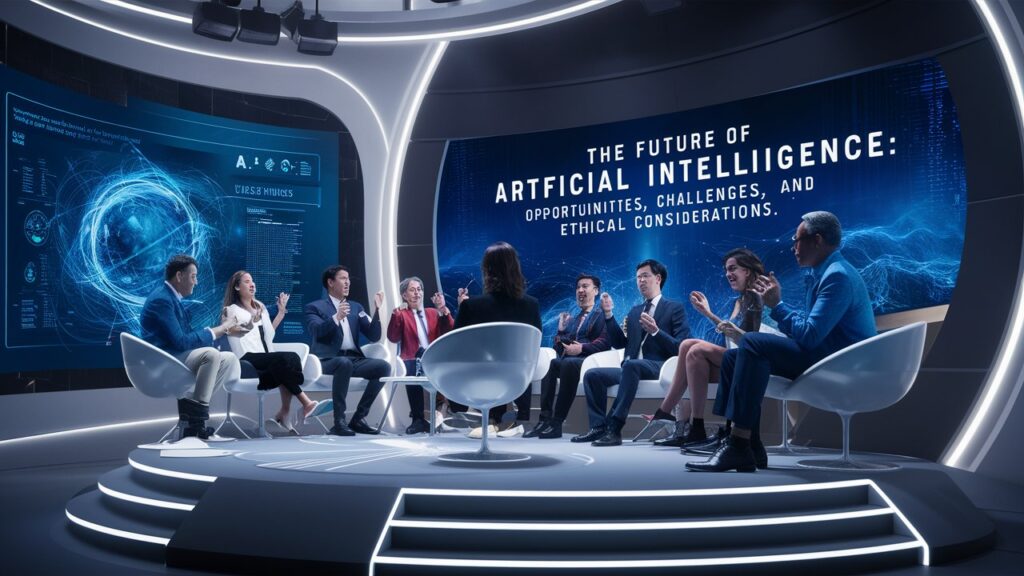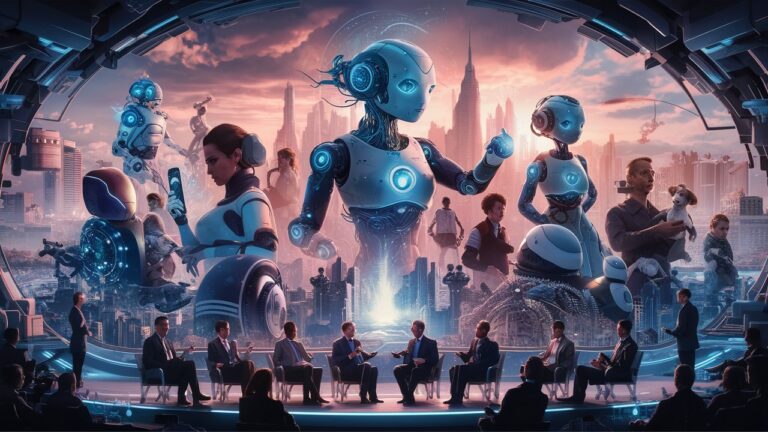Introduction
Artificial Intelligence (AI) has emerged as one of the most transformative technologies of the 21st century, reshaping industries, economies, and daily life. From self-driving cars to personalized healthcare, AI’s potential seems limitless. However, with rapid advancements come significant challenges and ethical dilemmas. This article explores the multifaceted landscape of AI, delving into its opportunities, technical and societal challenges, and the ethical frameworks needed to guide its development. Whether you’re a tech enthusiast, policymaker, or curious reader, understanding these dimensions is critical to navigating the AI-driven future.
1. Opportunities in AI: Revolutionizing Industries
AI’s ability to process vast datasets, recognize patterns, and automate tasks has unlocked unprecedented opportunities across sectors. In healthcare, AI-powered diagnostics tools are improving accuracy in detecting diseases like cancer, while predictive analytics enable personalized treatment plans. For instance, machine learning algorithms can analyze medical imaging faster than human radiologists, reducing diagnostic errors.
In business, AI-driven analytics optimize supply chains, enhance customer experiences through chatbots, and streamline decision-making. Retail giants use recommendation engines to boost sales, while financial institutions employ fraud detection systems to secure transactions. Meanwhile, in environmental sustainability, AI models predict climate change impacts and optimize energy consumption in smart grids. These applications underscore AI’s potential to solve complex global problems.
2. Challenges in AI Development: Technical and Societal Hurdles
Despite its promise, AI development faces significant obstacles. Technical limitations, such as the reliance on high-quality data, remain a barrier. Biased or incomplete datasets can lead to flawed outcomes, as seen in facial recognition systems that misidentify marginalized groups. Additionally, AI models like deep neural networks often operate as “black boxes,” lacking transparency in decision-making processes.
On a societal level, job displacement due to automation sparks concerns. While AI creates new roles in tech sectors, low-skilled workers in manufacturing or service industries risk unemployment. Moreover, the digital divide exacerbates inequality, as access to AI tools and education remains concentrated in developed nations. Addressing these challenges requires collaboration between governments, corporations, and educators to ensure inclusive growth.

3. Ethical Considerations: Navigating the Moral Landscape
Ethics lie at the heart of AI’s responsible deployment. Bias and fairness are critical issues; algorithms trained on historical data often perpetuate systemic prejudices. For example, AI used in hiring may disadvantage candidates based on gender or ethnicity. Mitigating this demands diverse training data and rigorous bias-testing protocols.
Autonomous systems, such as military drones or self-driving cars, raise questions about accountability. Who is responsible if an AI-driven vehicle causes an accident? Legal frameworks must evolve to address liability in such scenarios. Furthermore, privacy concerns loom large as AI systems collect and analyze personal data. Striking a balance between innovation and individual rights will define public trust in AI technologies.
4. The Future of AI: Trends and Predictions
Looking ahead, several trends will shape AI’s trajectory. Quantum computing could revolutionize AI by solving problems beyond classical computers’ reach, such as simulating molecular structures for drug discovery. Meanwhile, human-AI collaboration will become mainstream, with tools like ChatGPT augmenting creativity and productivity rather than replacing human roles.
Regulatory developments will also play a pivotal role. The European Union’s proposed AI Act aims to classify systems by risk levels, banning applications deemed harmful. Such policies could set global standards for ethical AI. Finally, interdisciplinary research—merging AI with neuroscience or ethics—will drive holistic solutions to societal challenges.
Conclusion
The future of artificial intelligence is a tapestry of innovation, complexity, and responsibility. While its opportunities promise to elevate human progress, the challenges and ethical quandaries demand vigilance and proactive governance. By fostering transparency, inclusivity, and ethical frameworks, society can harness AI’s potential while safeguarding against its risks. As we stand at the cusp of this technological revolution, collaboration across disciplines and borders will determine whether AI becomes a force for collective good or a source of division.
Frequently Asked Questions (FAQs)
Q1: Will AI replace human jobs entirely?
A: While AI will automate certain tasks, it is more likely to transform job roles rather than eliminate them. New industries and opportunities, such as AI ethics auditing or machine learning engineering, will emerge, requiring reskilling and adaptability.
Q2: How can we prevent AI bias?
A: Combating bias involves diversifying training datasets, implementing fairness-aware algorithms, and involving multidisciplinary teams in AI development. Regular audits and transparency reports also help identify and rectify biases.
Q3: What are the ethical risks of autonomous weapons?
A: Autonomous weapons could destabilize global security by enabling warfare without human oversight. International treaties, akin to chemical weapons bans, are essential to regulate their use and prevent unethical applications.
Q4: How can individuals stay informed about AI advancements?
A: Follow reputable tech journals, attend webinars, and engage with online communities like arXiv or AI ethics forums. Critical thinking about AI’s societal impact is crucial for informed citizenship.
Q5: What steps can businesses take to adopt AI responsibly?
A: Companies should prioritize ethical guidelines, invest in employee training, and engage stakeholders in AI deployment. Conducting impact assessments and ensuring data privacy compliance are key to building trust.
This article was crafted for severedbytes.net – your hub for cutting-edge tech insights.
